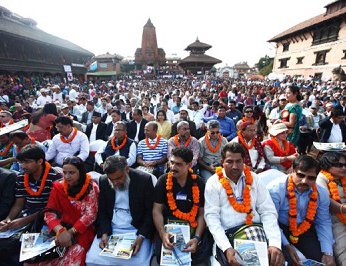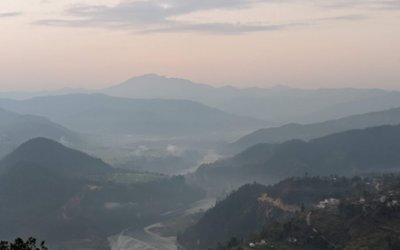
President Dr. Ram Baran Yadav inaugurated the SACOCAN-V aimed a function in Bhaktapur durbar square. During the opening, Bhaktapur district was declared as 10th Open Defecation Free (ODF) district. The opening was attended by government delegates, Civil Society Organization (CSO) representatives, donor organization and media groups from eight South Asian Countries like Afghanistan, Bangladesh, Bhutan, India, Maldives, Nepal, Pakistan and Sri Lanka.
Addressing the inaugural program, president Dr Ram Baran Yadav said: “Constitution of Nepal has guaranteed for right to live in safer environment to its citizens and sanitation journey in Nepal is one of the step ensuring rights given by constitution. Sanitation programs in Nepal were move forward as a movement. Efforts done by Bhaktapur District declaring the District ODF is an example of glory for the nation. Investment on sanitation is an important step to save lives of children.”
He further stated that proper management of urban sanitation is challenging and contaminated water should be treated before mixing on the river. Chhabi Raj Pant, Minister for Urban Development, Nepal said “Nepal has achieved remarkable success on improving sanitation.”
Similarly, Biddhyadhar Mallik, Minister for Federal State and Local Development, Nepal said, “Local bodies in Nepal will continue to vital role to promote sanitation in Nepal particularly on social mobilization part.”
The program was also addressed by Kishor Thapa, Secretary, Ministry of Urban Development, Abadh Kishore Mishra, Joint Secretary, Ministry of Urban Development.
On behalf of Civil Society Organization Ms Lajana Manandhar said,“Celebration of ODF is a result of community’s continuous effort that inspired people advocating for better sanitation.”
Raja Hasan Abbas, Secretary, Ministry of Climate Change, Pakistan said,”SACOSAN is knowledge sharing platform. Collective effort is key to achieve complete success.”
According to press release issued by Anita Pradhan Communications and Gender Officer WaterAid Nepal on behalf of SACOSAN-V Secretariat, the inaugural program was attended by people from various walks of life.
As the fifth South Asian Conference on Sanitation (SACOSAN V, 22-24 October 2013) kicks off in Kathmandu, Nepal, leading civil society groups called on their governments to recognize the urgency of the South Asian sanitation crisis and set robust plans to achieve universal access to improved sanitation toilets and ending open defecation by 2020.
In turn, civil society groups are committing to actively support South Asian governments to intensify efforts for ending the sanitation crisis in the region. Four hundreed delegates and speakers, including renowned experts and practitioners from the eight SAARC countries are attending this ministerial conference where civil society representatives and community leaders will share the views of thousands of people living with the reality of unsafe sanitation and calling governments to deliver on commitments made during SACOSAN IV in Colombo, Sri Lanka, in 2011.
They call for programs in line with the spirit of the UN General Assembly resolution and SACOSAN IV commitments, to recognize access to sanitation as a legally enforceable right;They urged South Asian governments to establish robust plans with adequate public funding to achieve universal access to improved toilets facilities and end open defecation by 2020.
The civil society leaders stressed that these time bound plans must be accompanied by comprehensive monitoring and evaluation plans; a sub-plan approach should be adopted by respective governments to ensure access to improved toilets for the poor and marginalized communities. The civil society leaders also call service providers to ensure toilets are accessible to everyone including people living with disabilities.
All school infrastructure development plans and designs, budgets for operation and maintenance, reporting and monitoring systems should integrate uneven progress on previous SACOSAN commitments. Despite high level commitments made during SACOSAN IV, there are still a billion people living without access to adequate toilets in South Asia.
Progress on sanitation is not reaching the poorest - Not only are current rates of progress on sanitation and hygiene too low in South Asia, much of the progress is not reaching the poorest. The current set of MDGs focus on average progress measured at country and global levels. These averages hide different inequalities, such as a rural - urban divide, exclusion of people living with disabilities and other marginalized groups.
Holistic plans are needed to tackle increasing urbanization -Each country is facing the challenge of increasing urbanization and must develop integrated plans that include the necessary policies, resourcing, technology and education. Here again, governments must ensure that these plans cater to the needs of the poorest and most marginalized. In addition, these plans must focus on sustainable management of human excreta and solid waste.
FAN South Asia Convener Ramisetty Murali says “it is high time that the governments of South Asia make an honest effort to implement past SACOSAN commitments to save the lives of millions of children dying from sanitation and hygiene related diseases and to improve the quality of life and livelihoods of the poor and most marginalized”
- TANAHU HYDROPOWER PROEJCT: A Significant Achievement
- Apr 15, 2024
- AMBASSADOR HANAN GODAR: Sharing Pain With A Nepali Family
- Mar 30, 2024
- VISIT OF KfW AND EIB TO NEPAL : Mission Matters
- Mar 25, 2024
- NEPAL BRITAIN SOCIETY: Pratima Pande's Leadership
- Mar 24, 2024
- NEPAL ARMY DAY: Time To Recall Glory
- Mar 15, 2024
















